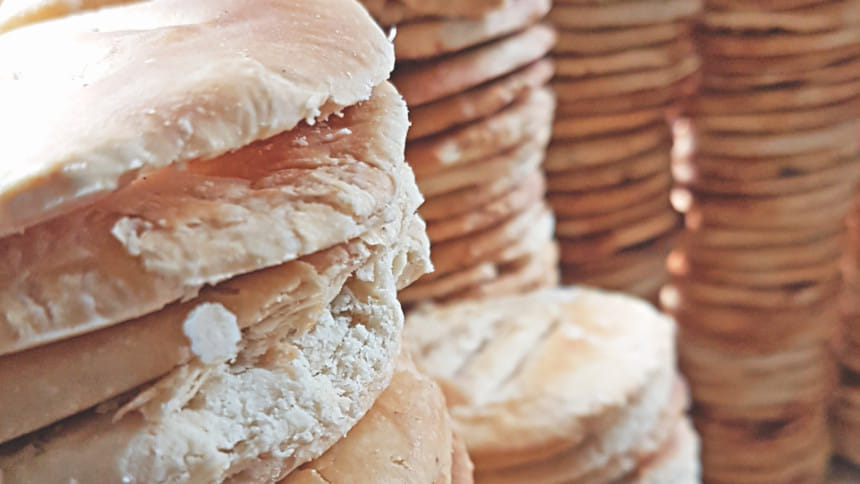Bakarkhani: A love story


Every day at the break of dawn, Yakub Ali heads out to his bakery at Nazira Bazar.
The 70-year-old resident of Old Dhaka walks slowly but confidently through quite a few alleys, then finally on Siddique Bazar Road.
He has been taking the same route for over six decades. Many things have changed along the way -- the neighbourhood, number of people, types of shops, amount of piled up garbage on roads and his walking speed. Then again some things did not -- his determination and destination.
He reaches his shop after 15 minutes. It’s already bustling with activities. His two sons -- Younus and Lokman -- are busy with preparation. Younus has already rolled the dough and cut it into small round pieces. Lokman, sitting next to a clay oven, was hooking those with a steel pointer and sticking them to the sides of the oven.
The place hasn’t changed much. Yakub still makes and sells one item at his shop -- bakarkhani.
Ask anyone in the old town about this crunchy delicacy and you’ll quickly learn that bakarkhani is personal. There is something deeply comforting about this traditional bread.
When this correspondent caught up with the trio on a Saturday morning, the first batch of bakarkhanis -- eaten as snack or breakfast with a cup of tea -- just came out of the oven.
A sweet aroma filled the air. The flat breads were dry and crumbly. The bakarkhani, with a kiss of sweetness, melts in the mouth with each bite. It also comes in various flavours -- regular, sweet and paneer (cheese).
Though stacks of freshly-baked bakarkhani at bakeries are a common sight in Old Dhaka, it still has not lost its appeal.
“It’s not just about making bread, it’s about doing what you love,” said Yakub while handing a pack to a customer.
The longtime patron nodded. “Bakarkhani is a must-have item on weekends.”
Bakarkhani is part of the Mughlai cuisine that consists of dishes developed in the medieval Indo-Persian world at the centre of the Mughal Empire.
Amid various Mughal delicacies what makes this biscuit-like bread unique is the history behind it, as narrated by Najir Hossain in his “Kingbadantir Dhaka”.
It was around 1700 when Murshid Quli Khan became Dewan of East Bengal and came to Dhaka. With him, he brought along a young boy named Aga Bakar.
Khan took a liking to the boy from the beginning and trained him in the arts of statecraft and warfare. Bakar was a quick learner too, and under Khan’s patronage he proved his mettle. Soon, he became the commander-in-chief of Khan’s army in Chattogram.
“This is where our story begins,” Yakub takes a sip of tea and adds. He is apparently aware of the legend as well. He said he heard it from his father. “It was in Chattogram, where Bakar met Khani Begum. She was a famous dancer from Arambagh.”
“For the two, it was love at first sight,” he adds.
“But Kotwal Jainul, son of a high official in Khan’s court, had his eyes on her. One day, Jainul tried to force himself on her. She was saved by Bakar. Soon afterwards, Jainul and Bakar ended up having a duel, which led to Jainul fleeing the area,” Yakub continues.
Utilising the opportunity, Jainul’s friends spread rumour that Bakar had killed him and hid the body. Even Khan was convinced. He sentenced Bakar to death and ordered to throw him in a tiger’s den. After a fierce battle, Bakar was able to get out by killing the animal.
Meanwhile, Jainul resurfaced and forcibly took Khani to the south-east part of Bengal and hid in a forest. By the time Bakar reached, it was too late. Jainul, out of jealousy, had stabbed her with his sword. She died in Bakar’s arms.
Bakar was devastated. He left everything behind and stayed in the area afterwards.
And to commemorate their love, he inspired bakers to make a special kind of bread and named it “Bakar-Khani”.
The tale had been inspiring generations of Old Dhaka bakers.
By the time the conversation ended, it was around noon. After quite a few bakarkhanis and cups of tea, when this correspondent was about to say goodbye, Yakub’s younger son Lokman said, “We have a tale of our own. Our mother became a huge fan of father’s bakarkhanis after buying some from grandfather’s shop.”
“It was bakarkhani that eventually brought them together,” Lokman quipped.
Asked, Yakub smiled and said, “That story is for some other time.”
Do you have a Dhaka Vibe story to share? Email us your ideas or features to [email protected].

 For all latest news, follow The Daily Star's Google News channel.
For all latest news, follow The Daily Star's Google News channel. 



Comments